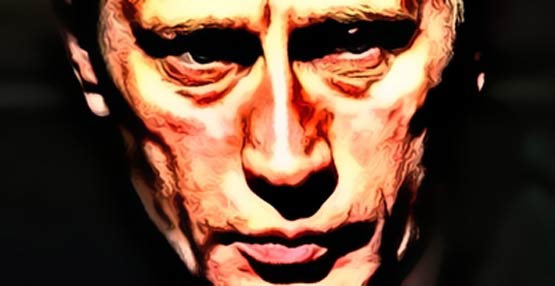
On Jan. 9, the Russian dissident Vladimir Kara-Murza celebrated a signal victory in a long campaign to hold Vladimir Putin's regime accountable for its human rights crimes. The outgoing Obama administration announced sanctions against Gen. Alexander Bastrykin, a close Putin confidant who heads the state investigative committee - the instrument used to persecute opposition activists with trumped-up criminal charges.
Kara-Murza, who divides his time between Moscow and Washington, had long campaigned for the designation of Bastrykin, just as he had pushed for passage of the law under which the general was targeted - the Sergei Magnitsky Act, which mandates sanctions on Russians involved in repression and corruption. For years Bastrykin "seemed too powerful to be sanctioned," Kara-Murza exulted in a Jan. 12 blog post. "That ceiling is now gone."
Exactly three weeks later, back in Russia, Kara-Murza felt a horrific and all-too-familiar sensation: His organs were beginning to shut down. He concluded immediately that he had been poisoned, just as he had been once before, in May 2015. His family rushed him to a hospital, where a doctor who helped save his life in the previous instance was waiting. Within hours he was in a coma, where he remained for a week.
Last week Kara-Murza met me in Washington, visibly frail and short of breath, but alive. He believes he somehow survived two attempts to murder him with a sophisticated and virtually untraceable poison - the same kind of attack that has killed a host of other Putin opponents in the past decade. He was also pretty sure why he was targeted: because of his work on the Magnitsky sanctions.
"It's revenge for the Magnitsky law, pure and simple," Kara-Murza told me. "It's the main thing they are afraid of. They have mastered the ways of silencing the opposition at home. For now the only thing they are really afraid of is Western countries closing the havens where they stash their money and send their families."
To the extent that it still exists, the opposition to Putin inside Russia is led by Alexei Navalny, the nationalist anti-corruption crusader. This month he posted a video allegedly documenting the vast trove of mansions, villas and vineyards accumulated by Prime Minister Dmitry Medvedev. By last week it had been viewed 9.7 million times on YouTube - proving that a lot of Russians are still interested in learning the ugly truth about their rulers.
Kara-Murza, however, may be regarded by the Kremlin as an equally dangerous opponent. Educated at Cambridge, he spent nearly a decade working as a journalist in Washington before becoming active in the opposition. A gifted speaker, he has deep connections in Congress: His hospitalization produced statements of concern from Republican Senators John McCain, Marco Rubio and Ron Johnson and Democrats Chris Murphy and Benjamin Cardin, among others. At 35, he carries the legacy of Boris Nemtsov, the liberal opposition leader who was gunned down outside the Kremlin in 2015. A film Kara-Murza made about Nemtsov (between hospitalizations) is touring Russia.
How is it possible to oppose Putin, other than by posting videos on the Internet and lobbying Congress for more sanctions? Kara-Murza spent much of 2016 in the Russian provinces, recruiting young people to stage hopeless runs for office in local and parliamentary elections. Two dozen signed up; collectively they were credited with receiving a little over 100,000 votes. None came close to winning.
But Kara-Murza and his sponsor, the exiled former oil-magnate-turned- political-prisoner Mikhail Khodor-kovsky, see themselves as seeding the next generation of Russian democratic politicians. "There has been an entire generation that has grown up without democracy or fair elections," Kara-Murza says. "We want to give them some kind of political experience."
For the same reason, the opposition coalition plans to nominate a candidate to run against Putin in next year's election. "We have no illusions. We know it's not a real election," Kara-Murza says. "But we will show that there is an alternative - because one of the founding myths of the Putin regime is that there is no alternative."
The prospect that President Trump will embrace Putin and his regime elicits little more than a shrug from this dissident. "It's only our job to effect political change in Russia," he says. "It's not the job of Trump or [Angela] Merkel." But, he says, "what we would ask is not to be helping Putin by treating him as a worthy player on the global stage - or allowing his cronies to use Western countries to stash the wealth they have stolen."
That's where the Magnitsky Act comes in. Bank account freezes and travel bans are poison for Putin's corrupt inner circle. Congress, with the prodding of brave Russians such as Kara-Murza, can do more to spread it.
Previously:
• 04/19/16: Obama's saddest legacy
• 04/05/16: The NATO that Trump doesn't see
• 03/08/16: The debate we need on Libya
• 02/24/16: Americans tortured by an American ally
• 02/12/16: Can Obama let go of his legacy wish?
• 11/09/15: Obama's olive branches are lifelines for authoritarian regimes
• 10/12/15: Putin's model of success
Diehl is deputy editorial page editor for The Washington Post. here.


 Contact The Editor
Contact The Editor
 Articles By This Author
Articles By This Author
